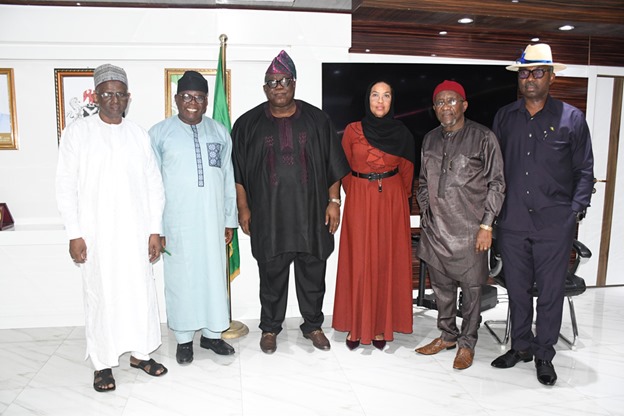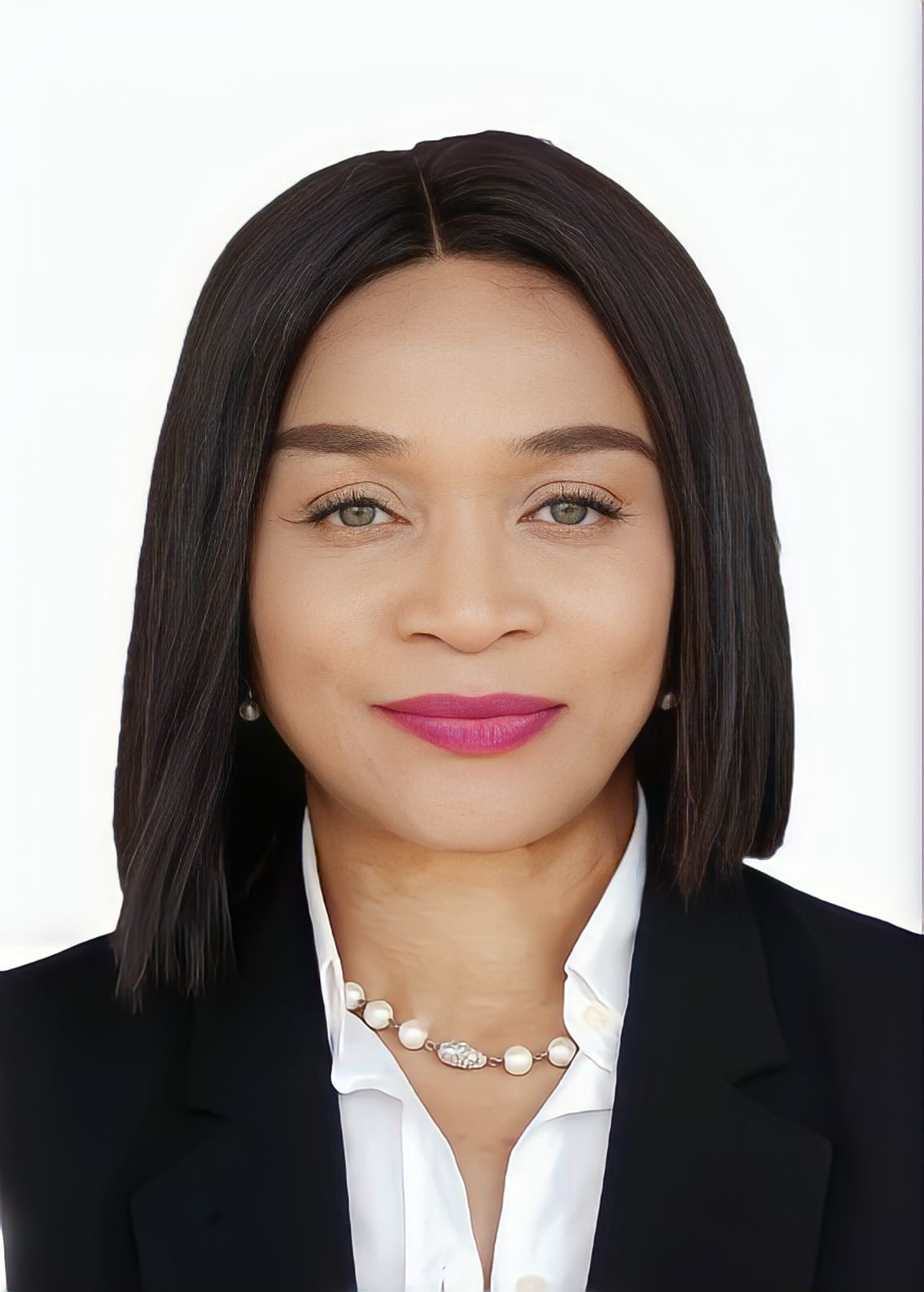News
Olaopa reiterates online training deepening in the Civil Service

Joel Ajayi
….assures Taraba HOS of his support.
The Chairman, Federal Civil Service Commission (FCSC), Prof. Tunji Olaopa has reiterated the need for civil service to deepen its capacity development by incorporating online training. He said people tend to think class room based training does so much to build capacity; saying that this is very limiting as we tend to emphasize big trainings neglecting basic skills trainings.
Olaopa stated this when Taraba State Head of Civil Service led by Mr. Paul Maigada Tino paid him a courtesy visit in his office.
He said mentoring should also be deepened; stressing that the unfolding methods of coaching and staff exchange as well as internship and cross-pollination of ideas should be encouraged in the public service.
While welcoming the guests, he said what Taraba Civil Service was facing was not dissimilar to what is happening in some other States. Olaopa asserts that what is needed in Taraba State is extensive rediscovery by bringing back some of the good practices and fundamental skills that made the reputation of Civil Service good in the good old days.
As he assured Taraba State (HOS) that he will give all necessary support and guidance to his team to succeed as he aimed to build effective and professionally oriented Service for Taraba State; he pointed out that Civil Service is the engine room for politics and governance; and he needed to manage the interface and relationship based on model that benefits from smart practices guided by administrative guidelines of the Service.
He revealed that it is very important for HOS to have cordial relationship with the State’s Civil Service Commission to have a sound footing. According to him, the two organizations have defined functions that complement each-other like Siamese twins and not to be in competition.
He told the guests that there was lot to benefit from the Federal in the areas of skills improvement through the online programmes especially the LEAD-P, SMAT-programmes among others. He concurred with Taraba HOS that meeting with the Federal-HOS was a good move. He advised that it should be strengthened to support the State’s IPPIS. He said LEED-P is an online training by Federal HOS is important; and he urged the team to engage with Federal HOS in this area; saying it will help them not only in training and development but with career and talent management of officers which he called “leadership pipeline” as the world is graduating to competence catalogue where organization specify competency it needs at every level.
He advised Taraba State Head of Civil Service on the need to work more on their online and digital penetrations especially e-governance programme for service delivery. He said there was a need for Civil Service to manage its interface with the youths through social media to avoid a lot of gaps in communications as the world is driven by Artificial Intelligence (AI) and technological innovations.
He said enhancing the competitiveness of pay and compensation for civil servant was key as part of re-professionalizing the service. He asserts that Taraba HOS needs to ground his staff in EFCC laws, ICPC laws and code of conduct as staff do not know them because of laxity bureaucracy. He equally said performance bond needed to be incorporated into Taraba HOS; stressing that in his interactions with the State’s Civil Servants they were very passionate and willing to learn based on their punctuality and quality contributions.
He disclosed that public and private partnership (PPP) which Taraba State embarked on was good but “governance code” known as Public Service Rules (PSR) needed to be rethink to attract private sector partnership. He specifically believed in strengthening basic bureaucratic skills, competency levels and basic internal management control in Taraba Civil Service; as well as Civil Service that returns to stewardship relationship with the public as people do not trust public institutions.
Speaking earlier, Taraba State Head of Civil Service, Mr. Paul Maigada Tino who came in company of his team disclosed that he was just appointed as Taraba State Head of the Civil Service. He equally said that he was in the Commission to collaborate in the area of manpower development; adding that Federal Civil Commission is very key in the affairs of Civil Servants in the country.
He further disclosed that Taraba State has few personnel at Federal level in terms of Federal appointments and they need the assistance of the Commission to fill this vacuum.
Tino recalled the capacity development seminar Olaopa conducted in the State which he said was very impactful on the Staff. He stated that the State wants to tap from the wealth of experience of the Chairman. According to him, working with FCSC-Chairman will enable them to fill the State’s Civil Service identified gaps. He revealed there was training gaps in the State’s Civil Service as those employed in the last two years were yet to get induction training.
He informed Olaopa that he has equally visited Office of the Head of Service of the Federation (OHSF) in order to strengthen the State’s IPPIS using its ICT capacity.
News
PSIN Administrator Commends Yobe Government for Championing Leadership Continuity and Institutional Sustainability

Cyril Igele
The Administrator and Chief Executive Officer of the Public Service Institute of Nigeria (PSIN), Barrister Imeh Okon, has applauded the Yobe State Government for its strong commitment to leadership continuity and sustainable governance through strategic investment in human capital development.
Barrister Okon gave the commendation at the opening of a Management Retreat for Yobe State Permanent Secretaries, held at the PSIN headquarters in Abuja.
The retreat, themed “Succession Planning, Leadership Continuity, and Institutional Sustainability in the Yobe State Public Service,” convened senior bureaucrats and resource persons to discuss strategies for strengthening leadership and governance within the state’s civil service.
In her remarks, the PSIN Administrator praised Governor Mai Mala Buni for his foresight and partnership in prioritizing public sector training and capacity development. She described the theme of the retreat as both “timely and visionary,” emphasizing that institutions endure only when leadership is continuous, knowledge is shared, and systems—not individuals—drive performance.
“Institutions thrive not merely on structures or policies, but on the deliberate cultivation of capable leaders who can sustain progress across generations,” she said. “By prioritizing leadership continuity and institutional resilience, Yobe State is leading by example.”
Barrister Okon reiterated PSIN’s mandate to build a competent, ethical, and innovative public service capable of delivering tangible results to citizens. She stressed that effective succession planning must be anchored in continuous training, mentorship, and exposure to emerging governance trends.
Citing best practices from Singapore and the United Kingdom, Okon noted that successful public service systems deliberately identify and nurture potential leaders through structured talent pipelines and transparent career development programmes. According to her, Yobe State’s initiative reflects its readiness to sustain excellence in governance.
She also highlighted PSIN’s flagship programmes—SMART-P, which builds administrative and technical capacity; LEAD-P, designed to groom emerging leaders; and the Exit from Service Masterclass, which prepares officers for life after service. Okon urged the Yobe Government to adopt the Exit Masterclass into its human resource framework to ensure a smooth transition for retirees, preserve institutional knowledge, and promote productivity through entrepreneurship and consultancy.
“Succession planning is not an event but a culture that must be institutionalised at every level of public administration,” she added. “When we prepare successors in advance and invest in continuous learning, we guarantee the sustainability of reforms and consistency in governance.”
Declaring the retreat open, the Acting Head of Service of Yobe State, Alhaji Abdullahi Shehu, reaffirmed Governor Buni’s commitment to building a results-driven and high-performing public service.
Represented by the Permanent Secretary, Public Service, Alhaji Shehu, the Acting Head of Service expressed gratitude to God and lauded PSIN as the “mother institution of public service learning.” He stated that Governor Buni has consistently directed the Office of the Head of Service to promote seamless succession planning and capacity building to enhance efficiency and accountability across government institutions.
“In line with this directive, we have brought the top echelon of the state civil service to PSIN—being the drivers and core implementers of government policies and programmes—to strengthen continuity and sustainability in our reforms,” he said.
He urged participants to fully engage in the retreat, share experiences, and cascade the knowledge gained to officers across ministries, departments, and agencies. The exercise, he explained, forms part of a deliberate strategy to institutionalize effective succession planning within the Yobe State Civil Service, thereby ensuring sustained productivity and improved service delivery to citizens.
-

 Featured6 years ago
Featured6 years agoLampard Names New Chelsea Manager
-

 Featured6 years ago
Featured6 years agoFG To Extends Lockdown In FCT, Lagos Ogun states For 7days
-

 Featured6 years ago
Featured6 years agoChildren Custody: Court Adjourns Mike Ezuruonye, Wife’s Case To April 7
-

 Featured6 years ago
Featured6 years agoNYSC Dismisses Report Of DG’s Plan To Islamize Benue Orientation Camp
-

 Featured4 years ago
Featured4 years agoTransfer Saga: How Mikel Obi Refused to compensate me After I Linked Him Worth $4m Deal In Kuwait SC – Okafor
-
Sports3 years ago
TINUBU LAMBAST DELE MOMODU
-

 News10 months ago
News10 months agoZulu to Super Eagles B team, President Tinubu is happy with you
-
Featured6 years ago
Board urges FG to establish one-stop rehabilitation centres in 6 geopolitical zones
